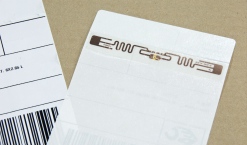

Doing laundry may not be everyone’s idea of a good time, but thanks to the wonders of modern technologies and detergent producers like Lavo Inc., it is no longer the dreaded time-consuming chore it used to be not all that long ago.
Today operating out of a state-of-the-art, 115,000-square-foot production facility in Montreal—recently upgraded with leading-edge RFID (radio frequency identification) capabilities in its packaging operations—this venerable producer of liquid laundry detergent, household bleaches, fabric softeners and residential cleaning products has come a long way since 1948, when local entrepreneur Ernest Bouthillier acquired the assets of what was then called Lavo Ltd. Bleach Company.
Already ranking as the fourth-largest bleach producer in Quebec, the company spent the next three years perfecting its manufacturing processes so that by the time it moved into a newly-built factory in Montreal’s east end in 1951, it was more than ready to start catering to the demands of the fast-emerging post-War consumer economy.
In the 1970s, the company entered the corporate acquisition game by acquiring local rival La Parisienne—a well-established and prestigious local brand name controlling about a third of the Montreal market—and quickly leveraged that corporate growth to become an important supplier to some of the province’s major retail chains, according to Lavo’s engineering-maintenance director Denis Leblanc.
“It was during that time period when large grocery chains started making plans to market their own brands of bleach and fabric softener,” Leblanc relates, “and thanks to its new production capabilities, Lavo was able to respond so well to these stores’ needs that most of the chains became its clients.”
In 1980, Lavo executed a buyout of a Purex factory in Ontario that was the central manufacturing facility for the long-enduring Old Dutch brand of household cleaners—renaming it Dutch Chemicals Inc. and proceeding to establish a solid market presence in the province.
In 1999, Lavo purchased the popular Hertel brand of household cleaners in a move that soon positioned the company as the leader for the household cleaners category in Quebec’s grocery market—a status it retains to this day.
But after years of expanding the geographic reach of its manufacturing operations, in 2000 the company decided to centralize its three divisions at one brand new, modern manufacturing facility in the east end of Montreal—completing its move there in the following year.
Today employing approximately 150 people, Lavo’s Montreal facility turns out a broad and diverse array of cleaning products under its own flagship brand names as well as for private-label clients in the grocery and pharmacy businesses—last year shipping over five million cases of product, Leblanc reveals.
Big Brands
“Our brand names are very strong, having enjoyed an excellent reputation with Canadian consumers for many decades,” asserts Leblanc, explaining Lavo’s impressive growth track record that has seen its annual sales climb over the $50-million mark.
Leblanc says that Lavo puts a high premium on product innovation, becoming one of the first companies in its field to embrace the emerging importance of sustainable manufacturing and packaging.
“Lavo was the first company to launch a truly ‘biodegradable’ liquid laundry detergent under the La Parisienne brand,” he points out. “We are proud that after two years in the market, the product is ranked as ‘number two’ in sales in the Quebec market, behind only Tide.”
Like many other leading North American CPG (consumer packaged goods) companies, Lavo’s business was profoundly impacted by the emerging market dominance of mega-sized Big Box and Club Store retailers in the last decade—quickly adding Wal-Mart and Costco to an impressive client list already boasting such Canadian retail stalwarts as Loblaw, Sobeys, Metro and Jean Couture.
But as Lavo found out, doing business with Wal-Mart has its own exacting price in terms of what suppliers must do to meet the retailer’s increasingly demanding expectations for value pricing and supply-chain compliance initiatives.
So when Wal-Mart’s long-stated objective to have its top suppliers start implementing RFID tagging finally became a mandated prerequisite for doing business, Lavo found itself in need of some expert advice on how to make it work effectively: without breaking the bank or messing up the plant’s highly-automated and efficient production process.
Advertisement

